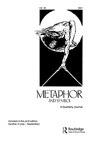How We Escape Capture by the “War” Metaphor for Covid-19
IF 3.3
3区 文学
0 LANGUAGE & LINGUISTICS
引用次数: 10
Abstract
ABSTRACT We rely on metaphors and the stories they imply as heuristic devices for communication on all important social and political matters. We are easily trapped by dominant metaphors, though fresh metaphors may generate significant paradigm shifts. During the first months of the Covid-19 pandemic, the “war” metaphor, standing for our relationship to Covid-19, established itself, like the virus itself, almost universally. This paper details the reasons for the early dominance of the “war” metaphor and shows how the adoption of the title of “wartime leader” by Donald Trump and Boris Johnson rebounded on them as it highlighted their subsequent abject failure to perform the roles they attributed to themselves. It highlights the objections, many valid, raised early on to the military metaphors and lists some of the alternative overarching metaphors which have been offered. It shows how, as the virus took root in most countries and governments had markedly different success in their responses to it, use of the “war” metaphor declined and people around the world coined a host of mini-metaphors relating to specific, local features, of their experience. It concludes by drawing attention to the potential of metaphors from ecology to generate insights relevant to some of the other major challenges faced by humanity.新冠肺炎的“战争”隐喻如何逃脱捕获
在所有重要的社会和政治问题上,我们依靠隐喻和它们所暗示的故事作为启发式的沟通手段。我们很容易被主导隐喻所困,尽管新的隐喻可能会产生重大的范式转变。在Covid-19大流行的头几个月里,代表我们与Covid-19关系的“战争”比喻,就像病毒本身一样,几乎在全球范围内确立了自己的地位。本文详细介绍了“战争”隐喻早期占据主导地位的原因,并展示了唐纳德·特朗普和鲍里斯·约翰逊采用“战时领导人”这一头衔是如何反作用于他们的,因为这突显了他们后来未能履行他们认为属于自己的角色。它强调了早期对军事隐喻提出的反对意见,其中许多是有效的,并列出了一些可供选择的总体隐喻。它表明,随着病毒在大多数国家扎根,各国政府在应对疫情方面取得了显著不同的成功,“战争”隐喻的使用减少了,世界各地的人们创造了一系列与他们的经历的具体、当地特征相关的迷你隐喻。最后,它提请人们注意生态学隐喻的潜力,以产生与人类面临的一些其他主要挑战相关的见解。
本文章由计算机程序翻译,如有差异,请以英文原文为准。
求助全文
约1分钟内获得全文
求助全文
来源期刊

Metaphor and Symbol
Multiple-
CiteScore
2.90
自引率
0.00%
发文量
23
期刊介绍:
Metaphor and Symbol: A Quarterly Journal is an innovative, multidisciplinary journal dedicated to the study of metaphor and other figurative devices in language (e.g., metonymy, irony) and other expressive forms (e.g., gesture and bodily actions, artworks, music, multimodal media). The journal is interested in original, empirical, and theoretical research that incorporates psychological experimental studies, linguistic and corpus linguistic studies, cross-cultural/linguistic comparisons, computational modeling, philosophical analyzes, and literary/artistic interpretations. A common theme connecting published work in the journal is the examination of the interface of figurative language and expression with cognitive, bodily, and cultural experience; hence, the journal''s international editorial board is composed of scholars and experts in the fields of psychology, linguistics, philosophy, computer science, literature, and media studies.
 求助内容:
求助内容: 应助结果提醒方式:
应助结果提醒方式:


